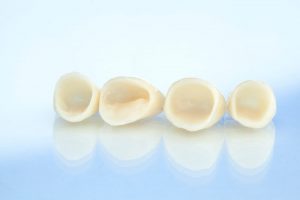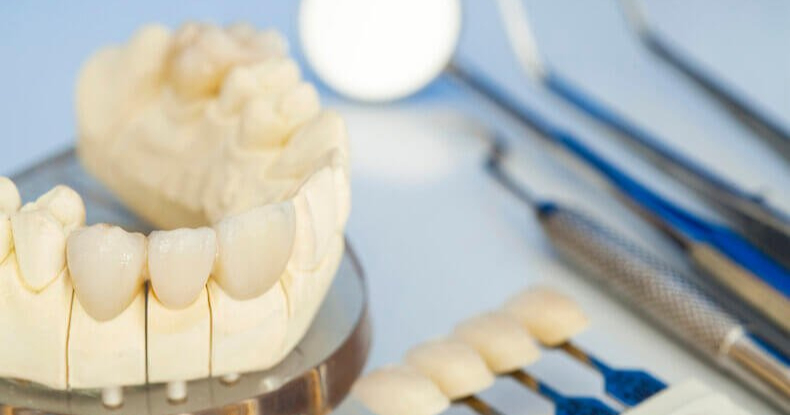Getting cheap dental crowns abroad is a great and affordable way to replace missing teeth. They can also be used to improve the appearance of your smile and increase its longevity. Dental treatments in the UK can be quite expensive, but if you look abroad, you’ll find much lower prices.

This article will answer the following questions about getting dental crowns abroad, so you can decide whether it’s worth travelling for treatment.
- What are dental crowns?
- What are the different types of crowns available?
- How much do dental crowns cost in the UK?
- Can you get dental crowns on the NHS?
- What do cheap crowns for teeth cost abroad?
We hope this article gives you all the information you need to make a decision about your dental care and whether it is worth going abroad for treatment!
What are dental crowns?
Crowns are caps that cover the entire surface of a tooth. They can be used to protect a vulnerable tooth or to replace large amounts of tooth structures that have been lost due to decay or injury. They can be made from porcelain, metal, or composite resin.
Crowns are used to restore teeth after large fillings have been placed in them, to strengthen a weakened tooth, and to cover dental implants.
A dental crown is usually placed on top of a tooth when a filling or root canal treatment has been done on it. The crown creates an entirely new surface that looks just like your natural teeth.
What is the procedure for getting dental crowns?
The process of getting one done varies depending on what type of crown you want. The procedure usually takes between two and three hours to complete and involves placing a temporary crown first before attaching the permanent one at a later date (usually two weeks later).
The temporary crown is held in place with cement while the permanent one is being made by your dentist or lab technician.
What is the difference between a dental crown and an implant?
If you’re looking into getting dental crowns, it’s important to understand the difference between a dental crown and a dental implant.
A dental implant is typically made of titanium and consists of three parts: an abutment, which is attached to the tooth; an internal framework that matches your existing teeth for added strength; and a surface screw-shaped fixture (called an “abutment cap”), which supports the replacement tooth. Crowns are caps that cover the entire surface of a tooth.
Now let’s take a closer look at the different types of dental crowns.
Types of dental crowns
PFM crowns
PFM stands for porcelain fused to metal. They are the cheapest and most widely used type of dental crown. They are made by bonding a layer of porcelain to a metal frame. The porcelain acts as the tooth’s new enamel, while the metal frame holds it in place.
The reason that PFM crowns are so popular is that they’re not only durable and long-lasting, but they also look very natural. So, if you’re looking for affordable dental crowns abroad and want something durable that will last your lifetime, then PFM dental crowns might be just what you need!
Ceramic crowns
A porcelain or Zirconia dental crown may also be referred to as an “all-ceramic” crown because they are completely made out of ceramic materials and do not contain any metal parts inside like other types of dental crowns do.
These crowns can come in a variety of colours and styles to match your natural teeth. They may also be made in different shapes so that they fit more comfortably in your mouth.
Emax crowns from Ivoclar Vivadent are made from a single block of lithium disilicate, which makes them slightly more durable than other types of all-ceramic crowns.
Other types of ceramic crowns are built up layer by layer in a laboratory which gives them the same slightly translucent appearance as natural teeth.
Ceramic materials tend to be more brittle than metal and are more liable to crack or chip and therefore may need to be replaced sooner.
However, they are often used when there is not enough healthy tooth structure left for bonding or veneers to hold them in place securely enough for long-term use.
Metal or alloy crowns
Metal or alloys are much stronger than porcelain or ceramics but cost more due to their complexity in manufacturing.
There are three basic types of metals used in dental crowns, and you should be aware of them so you can decide what’s best for your situation.
The first is gold, which is very durable and has been shown to last as long as 20 years in some cases. However, it is also extremely expensive and tends to be heavy on the jawbone, which can cause discomfort for some patients.
The second type of metal is alloys made from other metals such as silver or palladium. These alloys are more affordable than gold but still very strong and durable, so they tend to last about 10 years before needing replacement.
The third type of metal used in dental crowns is porcelain fused to metal (PFM), which we discussed previously. PFM crowns combine the strength of a metal alloy with the beauty of porcelain for an aesthetic that’s hard to beat.
Composite dental crowns
These crowns are made up of composite resin, a non-metallic material that can be used to fill in cavities and restore the shape of teeth. It is also used to make veneers, which are thin shells covering the front of a tooth, making it appear whiter or straighter.
Composite dental crowns are often preferred over porcelain crowns because they are less expensive and easier to install. However, they do not last as long as porcelain crowns because they aren’t as strong or durable.
How much do dental crowns cost in the UK?
In the UK, the price of dental crowns varies depending on the location, size and complexity of the procedure. It’s important to understand that every case is different, so there’s no way to predict exactly how much your crowns will cost.
If you do get it done privately though then expect costs upwards from £500 per crown!
Dental crowns are available on the NHS for people who meet certain criteria. If you meet these criteria, then your dentist will offer you the type of crown they consider clinically necessary.
A dental crown on the NHS will be charged as a band 3 treatment (£282.80) in England. The cost may be slightly different in other UK countries.
Most people who need a dental crown will qualify for dental treatment through the NHS. However, you may need to wait for an appointment, and with current waiting times, you may be waiting a long time!
Cheap dental crowns abroad
If you’re looking for cheap dental crowns, then why not look abroad? You can get cheaper dental treatment abroad while enjoying a holiday at the same time!
There are a few countries where they are much cheaper than in the UK. The two most popular are Thailand and Poland.

In Thailand, you can find dental crowns that cost up to 50% less than they would in the UK.
For example, if you have your dental crowns made in the UK and go private then it will cost between £1,000-£2,000 depending on your dentist’s fee and other factors.
A dental crown made in Poland costs between £180 to £380, so even including travel costs it still ends up being a better deal than getting one made here at home!
What is the process for getting dental crowns abroad?
You may be wondering how easy it is to find cheap dental crowns abroad. Well, that’s where Dentaly Go can help.
Dentaly Go is a platform that helps you find the best dental clinics abroad. We’ve hand-picked these clinics based on their excellent service, high standards and competitive prices. They are all known for providing high-quality treatments at affordable prices.
There’s no need to worry about finding a dentist who will take good care of you—every practice we work with is ISO9001 and TEMOS certified and you can rest easy knowing they have been thoroughly screened and vetted by our team.
We know how daunting it can be to get dental work done abroad, but we want to make sure that everyone gets the best experience possible.
Conclusion
Dental crowns can be a good solution for someone who wants to replace a damaged tooth. They can also be a good alternative for dentures. Crowns are cheap abroad and in the UK, you just need to look for them.
Crowns are caps that are placed over the top of your natural tooth or teeth, restoring their strength and appearance. They’re used when there is damage from gum disease, decay or injury and they’re made out of metal, alloy, porcelain or plastic according to the individual case of each patient.

They can be an excellent solution for a damaged tooth. They are better than dentures because they don’t slip as dentures do. They also look better than most other options like bridges or implants because they will match the colour of your natural teeth and they won’t come loose as other solutions might do over time.
If you are looking for cheap dental crowns, then looking abroad is the best way to find affordable prices and enjoy a holiday at the same time. You can save up to 50% on dental costs in the UK, and in some cases even more than that depending on the country you travel to.
So, if you’re interested in getting cheap dental implants abroad, don’t hesitate to get in touch and get your free quotations.
We hope that this article has given you all the information you need to make an informed decision on your dental care!
FAQs
What is the procedure for getting dental crowns?
The process of getting one done varies depending on what type of crown you want. The procedure usually takes between two and three hours to complete and involves placing a temporary crown first before attaching the permanent one at a later date (usually two weeks later).
What is the difference between a dental crown and an implant?
A dental implant is typically made of titanium and consists of three parts: an abutment, which is attached to the tooth; an internal framework that matches your existing teeth for added strength; and a surface screw-shaped fixture (called an “abutment cap”), which supports the replacement tooth. Crowns are caps that cover the entire surface of a tooth.
How much do dental crowns cost in the UK?
In the UK, the price of dental crowns varies depending on the location, size and complexity of the procedure. A dental crown on the NHS will be charged as a band 3 treatment (£282.80) in England. The cost may be slightly different in other UK countries.
References
NHS. What dental services are available on the NHS? Consulted 22nd August 2022.



